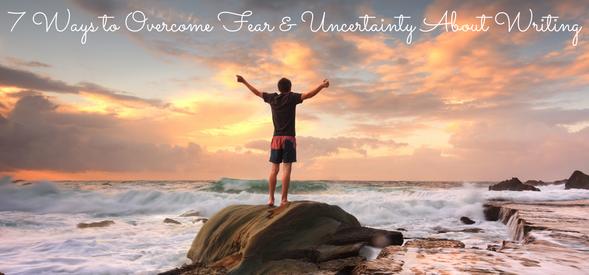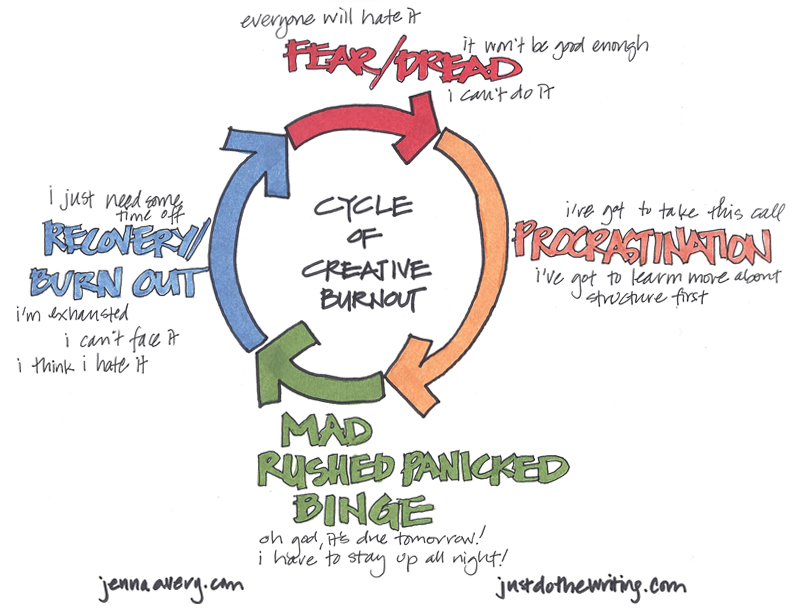
by Jenna | Jul 23, 2014 | Guest Posts
 Note from Jenna: This guest post is from one of our excellent writing community coaches and screenwriter, Sarah Newman. I’ve been thrilled to have Sarah as a coach over the last year and a half, and her group participants absolutely adore her (as do I). She brings a compassionate, listening spirit to her coaching and she is an excellent role model with her strong writing work ethic. In her own writing, Sarah primarily works on TV pilots and features.
Note from Jenna: This guest post is from one of our excellent writing community coaches and screenwriter, Sarah Newman. I’ve been thrilled to have Sarah as a coach over the last year and a half, and her group participants absolutely adore her (as do I). She brings a compassionate, listening spirit to her coaching and she is an excellent role model with her strong writing work ethic. In her own writing, Sarah primarily works on TV pilots and features.
Today Sarah has written about several clever ways she and her group members have discovered to get themselves unstuck, past any fear or uncertainty, and stay in action with their writing.
Take a look and see what might work for you!
7 ways to overcome fear and uncertainty about writing
by Sarah Newman
One of my favorite aspects of working as a coach with the writing community is how my group participants and I learn so much from each other by sharing our writing processes and challenges in our online progress logs on the writing community site.
Through this work together, we’ve learned a great deal from each other about how to get going with our writing in spite of any fear, doubt, or uncertainty we’re facing.
Here are seven of my top methods to keep the writing moving that we’ve embraced in my group:
1. Work outside the document
One of our favorite ways to overcome fear or uncertainty with a section of writing is by working on it “outside” of the main document.
When I use this technique, it might look like opening a new blank document (sometimes I label mine “scrap” to really take the pressure off) or putting pen to paper. I find this gives me a greater sense of freedom to try something out and to write more boldly.
When working on rewrites, I’ll sometimes take a scene I’ve written and paste it into a new blank document to experiment with combining it with another scene or to make changes and cuts. It feels less set in stone and safer, knowing the original version is there if I want to revert back to it.
One of my group participants put her own twist on this by doing what has come to be known in our group as a “literal cut and paste”, where she’ll print and cut out sections of her chapter and move them around to assess the flow and to determine where cuts or additions can be made.
2. Have a conversation with yourself on the page
Some of my participants and I find ourselves ruminating on our projects in our morning pages or keeping a project journal to record thoughts and reflections. Having a safe place to explore our writing can lead to important insights and breakthroughs.
We journal in response to questions about content, like:
- What’s the worst thing that could happen to my protagonist at this point?
- What would be the most interesting location for this scene?
Or we dialogue with ourselves about issues coming up for us around the writing itself, by answering questions like:
- Why am I shying away from digging deeper here?
- What initially drew me to this project?
- What do I need in order to keep going?
It’s about having a conversation with yourself and writing out all possible answers, no matter how silly some may seem. We find that this process helps us get past our inner critic’s judgments and back into the flow of writing.
3. Remind yourself that no writing is wasted
We have a “no writing is wasted” motto in my group.
Whether we end up changing the material or cutting it completely, it still has value in moving us forward . . . even if it feels like it moved us backwards or sideways!
Trying something, anything, is often better than trying nothing at all and can get us going again with our writing. Mistakes are valuable. Those “wrong” turns often lead us to the “right” path.
4. Sit with the mystery
It may be uncomfortable at first as the cursor blinks tauntingly, but the process of writing itself often generates connections and ideas that will help us find our way. We don’t have to have all the answers up front.
I love when my group participants report that by sticking with it and giving themselves permission to just write, they were able to have a breakthrough.
Reframe your self-doubt and uncertainty as a call to adventure with possibilities to explore.
5. Walk it out
And then again, sometimes it can be helpful to know when to get up and take a break.
Going for a walk is a common practice in my group. My participants often report finding inspiration out in nature.
For myself, I find many ideas are born and problems solved while I wander the streets of New York City. Not to mention the added bonus of overhearing potential tidbits of dialogue. :)
6. Make friends with a timer
Solo writing sprints are part of many of our writing routines, in addition to the daily scheduled group sprints through the writing community. With the help of our trusty timers we fight the good fight against procrastination and resistance. On days when it’s difficult to start, perhaps we’re distracted or perhaps we’re facing a particularly challenging piece of the writing, we’re able to coax ourselves to get going by setting that timer for a small, doable amount of time.
I find I’ve become trained so well now that once I hit that start button, I’m off and writing, and I often find myself resetting it for more time.
7. Trust the process
Recently I noted how it helps to trust the process even when I can’t necessarily see it at work. This is true for my group participants as well. If we continue to show up and chip away, the writing naturally unfolds. As much as we sometimes want to get more done and hurry up to finish, patience with ourselves and trusting the process helps us remain consistent and see things through to completion, even when fear or doubt wants to lead us astray.

Sarah Newman is a published writer living in New York. She writes short fiction & creative non-fiction, original one-hour drama pilots & screenplays, and zines. Sarah studied dramatic writing at NYU’s Tisch School of the Arts. When she’s not writing, reading, or watching story in all its glorious forms, you can find her on walking adventures around New York City and on Twitter at @mischiefandmusings.bsky.social.

Thanks for reading!
We’d love to hear your thoughts in the comments.
Warmly,


by Jenna | Oct 30, 2013 | Writing Articles
One of my all time favorite quotes about writing comes from Steven Pressfield, author of what has become my bible for writing, The War of Art*. In it, he says:
"There's a secret that real writers know that wannabe writers don't, and the secret is this: It's not the writing part that's hard. What's hard is sitting down to write. What keeps us from sitting down is Resistance."
As a writing habit and motivation coach, I work with writers all over the world who face and tackle this resistance every single day as they struggle to sit down to write. Very often that resistance takes the form of the word "But".
- But I don't have enough time.
- But I don't have enough training.
- But I don't know what to write.
- But I'm not inspired.
- But I'm not a good enough writer.
- But I'm not in the right mood.
- But I need to take care of all these other tasks first.
- But I'm not making enough money yet to justify taking time to write.
- But I don't have a laptop.
- But I'm tired, I didn't get enough sleep last night.
- But I'm too busy.
- But my day job takes up too much of my time.
- But I don't have a private space.
- But my kids will interrupt me.
- But my mom might call and need me.
- But I'm bored with this project.
- But I can't decide which project to start with.
- But I'm stuck.
- But I have writer's block.
- But if I was a real writer, it would come easily to me.
- But I have to deal with this crisis/emergency/major life issue first.
Guess what?
All these Buts are just stories. They are coming up for a deeper reason.
The deeper reason is fear.
Fear is what truly stops us from writing. The Buts are just the surface level rationalizations for fear. They are convenient excuses to keep your butt out of your chair and doing other things so you don't have to face the discomfort of taking on your dream.
Pressfield also says:
"Never forget: This very moment, we can change our lives. There never was a moment, and never will be, when we are without the power to alter our destiny. This second, we can turn the tables on Resistance. This second, we can sit down and do our work."
It turns out that actually DOING the writing is fairly easy. Most of the writers I work with find that once they are actually putting words on the page, they forget about the inner struggle and just do the work. In my writing community we run five weekly group writing sprints to help our writers overcome the resistance to sitting down to write (and to curtail the sense of isolation). My other favorite trick is to write first thing in the morning with a timer running. Pushing the start button gives me a "GO" that gets me into gear even when the Buts are loud and pernicious.
The thing to notice here is that fear is a beacon. It guides you exactly where you need to and even want to go, though you may not be aware of that wanting yet. The thing is, if it wasn't a big, big dream, you wouldn't be afraid of it.
No, I'm not talking here about naturally protective fear that keeps you safe from lions, tigers, and bears -- that's GOOD fear -- I'm talking about the kind of fear that's a holdover from when you were a kid, the kind that's trying to keep you safe from any kind of personal humiliation or risk. This is also the kind of fear that's keeping you "safe" from achieving your dreams.
I didn't quite mean for this to become an ode to Steven Pressfield, but he has so much genius on this subject I can't help sharing a few more of my favorite quotes from him about fear:
"Fear is good. Like self-doubt, fear is indicator. Fear tells us what we have to do. Remember our rule of thumb: The more scared we are of a work or calling, the more sure we can be that we have to do it."
And:
"Figure out what scares you the most and do that first."
So it's time.
It's time to stop listening to the Buts, the fears, the doubts, and the rationalizations. It's time to site down and do the work, to coax yourself through the fear with lots of support and promises of rewards, to feed your own well of creative inspiration so you feel consistently nourished and ready to write, and to learn whatever you need to learn so you feel equipped to do the writing. But above all else, it's time to write.
You may also be interested in:

by Jenna | Sep 4, 2013 | Writing Articles
One of the cleverest smokescreens in writing is creative apathy.
This is the point with a project where you suddenly get bored or lose interest in your writing. It tends to crop up at key stages in your writing project, like midway through or even just shy of the end.
When you hit it, you’ll start thinking maybe you’re just not that interested in this project and maybe it’s time to move on to something else.
But is that your highest truth?
I call creative apathy a smokescreen because it tricks you into thinking you’ve lost interest. It obscures the fact that you’ve encountered resistance to your project. It sends you off on a tangent, looking for other projects, wondering why you’ve lost interest, thinking maybe you never should have picked the project in the first place.
In my experience working with writers this creative apathy usually comes up as a response to either fear or creative burnout. The latter, creative burnout, comes about from pushing ourselves too hard or too long and becoming creatively exhausted. The former, fear, happens when we bump up against the places in our writing where we feel uncomfortable.
This fear could be as simple as being afraid to do the hard work, not knowing what comes next, or not knowing how to solve a story problem. It can be triggered by not having enough information about how to proceed with a task.
The fear can also arise from beliefs about your ability and talent, like a belief you should already know exactly how to do something before you even try.
I find that many, many writers hold this idea that writing should come naturally. That it should be easy, and that if it isn’t, it is a matter of a lack of talent or ability.
Carol Dweck, in her book Mindset: The New Psychology of Success*, suggests that this belief demonstrates a “fixed mindset” – that we have everything we are capable of having from birth, that we cannot improve or increase our skills, etc. She contrasts this with a “growth mindset”, which says that we are capable of more if we focus on learning and applying ourselves.
I was struck by this comment she made:
“People are all born with a love of learning, but the fixed mindset can undo it. Think of a time you were enjoying something – doing a crossword puzzle, playing a sport, learning a new dance. Then it became hard and you wanted out. Maybe you suddenly felt tired, dizzy, bored, or hungry. Next time this happens, don’t fool yourself. It’s the fixed mindset. Put yourself in a growth mindset. Picture your brain forming new connections as you meet the challenge and learn. Keep on going.”
What if the next time you feel bored with a project, you consider the possibility that fear is coming up and sending you into a fixed mindset place – the very opposite of creativity – and instead choose to believe that you are capable of solving whatever problem you’re avoiding, even if it means getting help, brainstorming longer, or doing research to help you tackle it?
In other words, what if you adopted a perspective that said, “I can do this, somehow, even if I can’t see how yet“?
Perhaps it helps to also hold the belief that if you conceived of the project, you are also capable of seeing it through.
Your turn
Do you fall for creative apathy or forge through it? What’s your approach? I’d love to hear your thoughts in the comments.
Warmly,

You may also be interested in:
* Affiliate link

by Jenna | Nov 7, 2012 | Writing Articles
In my writing community we periodically talk about creative burnout.
In our Western culture we work hard, driven by puritanical work ethics, cultural programming, keeping up with the Joneses, guilt, etc. It's no wonder we're exhausted.
We push and push ourselves, expecting our wells of creativity, resourcefulness, and inspiration never to run dry.
And then one day, we turn to the well and find it empty. No ideas. Maybe even a sense of dread and apathy.
The only way out is through
In a recent blog post, Mark Sanderson talks about his experience with this kind of creative depletion and how he recovered from it. Interestingly, his solution had to do with carrying on and doing the work no matter what.
He said:
"Some call it 'writer’s block.' I call it sheer terror. When this happens you need to relax and continue to work at your process. I know this too well from experience, but it still proves true every time – the only way to solve specific problems is to sit down and focus on the work."
It seems the only way out is through.
It takes courage
Writing -- for that matter doing anything that calls us to step out of our comfort zone -- requires a great deal of courage. A willingness to be uncomfortable often. To sit in it, do the work, and get to the other side.
No wonder we tend to procrastinate rather than facing that terror and doing it anyway.
Procrastination and burnout are close cousins
I've observed that procrastination plays a key role in creative burnout -- part of a vicious, intertwined cycle:

The reason we work past the point of endurance and exhaust ourselves is that we have procrastinated for so long that we are forced to push ourselves. And the reason we procrastinate that we are afraid.
I love what Steven Pressfield says about fear in his book Turning Pro:
"The professional, by the way, is just as terrified as the amateur. In fact the professional may be more terrified because she is more acutely conscious of herself and her interior universe. The difference lies in the way the professional acts in the face of fear."

by Jenna | Apr 13, 2012 | Writing Articles
If you’ve ever felt called to doing something artistic or creative, you’ve probably also realized by now that it can be pretty uncomfortable to share that work with other people.
There’s a deep vulnerability that comes with sharing our voices, art, words, acting, performing and other creative expression that can be so unnerving that many people never quite get past the word “Go” and instead sit on the side lines, reluctant to put themselves out there.
- I see it with writers who never quite seem to finish their writing projects or stall when it comes to developing plans to get their work into the world.
- I see it with actors who are terrified of going to auditions and postpone calling their agents until they “feel ready again.”
- I see it with artists who hide their work away in their studios and never make a sale.
I have something to tell you.
This is all driven by fear.
Fear that you aren’t good enough, won’t measure up, don’t have something new to say, that what you say won’t be liked, think you’re being presumptuous to think you deserve a place at the table and more.
I know because I feel ALL of those things myself. Every single one of them.
The key is to not to let the fear stop you. I like to help you look directly and compassionately at the fears and old wounds that hold you back so you can move forward more comfortably and courageously. Usually those fears aren’t so scary when we nudge them out into the light.
An experiment
If you want to experiment with this, write down a fear that’s swirling around in your head right now (I’ll wait, and yes, I really do want you to write it down in black and white on paper).
Okay, now ask yourself, “Is this true? Do I know this for sure?”
Then ask, “How can I reframe this belief?”
Here’s an example:
- The fear: “My script isn’t good enough.”
- Is it true?: “No, I don’t know that for sure.”
- Reframed: “I’m going to focus on the strengths of my script and do my best to make sure they shine.”

 Note from Jenna: This guest post is from one of our excellent writing community coaches and screenwriter, Sarah Newman. I’ve been thrilled to have Sarah as a coach over the last year and a half, and her group participants absolutely adore her (as do I). She brings a compassionate, listening spirit to her coaching and she is an excellent role model with her strong writing work ethic. In her own writing, Sarah primarily works on TV pilots and features.
Note from Jenna: This guest post is from one of our excellent writing community coaches and screenwriter, Sarah Newman. I’ve been thrilled to have Sarah as a coach over the last year and a half, and her group participants absolutely adore her (as do I). She brings a compassionate, listening spirit to her coaching and she is an excellent role model with her strong writing work ethic. In her own writing, Sarah primarily works on TV pilots and features.![]()
![]()






